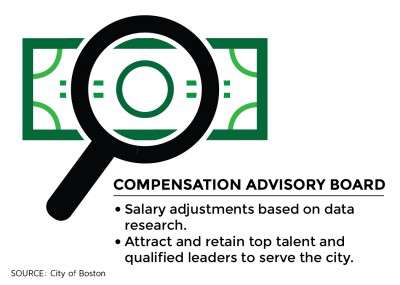
Boston Mayor Martin Walsh announced Monday his reconstitution of the Compensation Advisory Board, a five-person committee responsible for monitoring adjustments to the City’s salaries and expenses to ensure they can be justified through data assessment and analysis, according to a Monday press release.
The five-person board is chaired by Deborah Shah, who previously served as executive vice president of strategic consulting at Fidelity Investment’s Brokerage Company.
“Ensuring that the City of Boston’s employees and elected officials are receiving an appropriate salary that balances the great work that they do with the commitment to responsible spending for the taxpayers is of huge importance,” Shah said in the release. “I look forward to doing the kind of data-supported independent analysis that is crucial in providing insight to the City of Boston on appropriate compensation that will ensure Boston remains in the best possible position to attract and retain top talent and qualified leaders to serve the people of the City.”
The board is also seated by Michael Curry, president of Boston’s NAACP; Carol Fulp, president and CEO of the Partnership, Inc., a leadership and talent management organization for people of color; Amy Sheridan, a partner in Sullivan & Worcester’s Boston office tax department; and William Sinnott, a private practitioner and leader in the legal community with almost 30 years of legal experience, according to the release.
The board is tasked with analyzing certain aspects of Boston’s government—structure, form, size and the salary of its public officials—against municipalities representing other areas of Boston’s structure, both similar and different, to monitor adjustments for the City’s salaries and expenses, said Chris English, spokesman for the City of Boston Intergovernmental Relations Department.
“Certainly, population and city size is a factor in determining which cities are appropriate to use in the analysis,” he said. “But also the function of the different officials and the structure of the government within that municipality.”
The advisory board was first created in 1986 to provide biannual updates and recommendations on adjustment to the salaries of officials at various levels, including Boston’s mayor, City Council and other public officials whose salaries are outlined in the City’s ordinance, English said.
The City temporarily discontinued the board from 2006 to 2013, during the economic downturn, a time when English said raising salaries could not be justified.
“Last year, the board issued a recommendation under the prior administration,” he said. “All members of the board, their terms had expired, so the reconstitution of the board as it stands is simply Mayor Walsh appointing people as valid board members.”
In September, Boston City Council President Bill Linehan proposed a 28.6 percent raise in salary for city councilors. Walsh rejected the proposal on Oct. 24, saying it needed “further independent analysis.”
The councilors’ salary adjustment proposal spurred conversation once again over the mechanism by which salaries should be adjusted, English said. The board was reconstituted partially in response to Walsh’s commitment to working with City Council. The Compensation Advisory Board will conduct an assessment and analysis of the salaries of Boston’s public officials and issue recommendations in a “data-driven and comprehensive analysis way.”
“The discussion of the compensation advisory came about during talks between the administration and the city council for several different iterations of compensation and salary discussions,” he said. “He made a commitment to the council that within the first 90 days of the board’s discussions, he would issue a recommendation specific to city council. The remainder of the term would then really focus on the other officials whose salaries are set by ordinance.”
Several Boston residents said they support Walsh’s decision to reconstitute the Compensation Advisory Board and hoped it would be a good change for the city.
Madison Growe, 21, of Allston, said change can be a good depending on what the City needs.
“Change is always a step forward,” she said. “Depending on who the officials are, I hope they can make the right changes for things like the public schools in Boston. It’s up to the voters to decide, and I know they made the right choice with their mayor.”
Jean Thony, 26, of Hyde Park, said she supports the mayor’s reconstitution of the Compensation Advisory Board.
“You can’t go wrong with changing things up,” she said. “If it’s good for the city, I’m ok with it.”
Trena Melton, 24, of Jamaica Plain, said trying new things could be good for Boston.
“It doesn’t hurt to try,” she said. “New officials can’t hurt, so let’s try it.”



















































































































